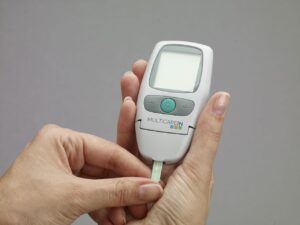Health Complications

Uncontrolled diabetes can develop both acute as well as long-term chronic complications.
Acute Complications
A diabetic is likely to develop acute complications as a result of sudden and severe decrease or increase in blood glucose levels.
The rapid and severe lowering of blood glucose below certain normal limits (below 40-50 mg/dl) is known as Hypoglycemia. Suffering hypoglycemic shock can be a serious condition for a diabetic patient.
Common reasons for hypoglycemia:
- Less food (carbohydrate) intake – less than usual amount
- Excessive exertion/ strenuous exercise – more than usual
- Accidentally larger dose of Insulin doses injected
- Larger dose of oral pill – intentionally/ by mistake
- Intake of alcohol with anti-diabetic drugs
- During fasting
- Taking insulin doses on an empty stomach
Symptoms of Hypoglycemia: Patient with hypoglycemia experiences symptoms such as cold sweats, tremors, goose skin, headache, weakness, slurred speech, blurred vision, memory lapses, giddiness, restlessness, palpitation, visual impairment, confusion, disturbed consciousness, and even coma if not treated medically.
How to avoid and correct Hypoglycemia:
Avoid the entire situation mentioned above which can lead to hypoglycemia. If any of the warning symptoms appears in diabetic subjects, then immediately
- Drink 10-15 gms. sugar with water
- Drink 10-15 gms. glucose with water
- Eat 1-2 sweet biscuit
- Drink 100 ml fruit juice
- Drink 100 ml cold drink
- Eat a candy or chocolate
Ketoacidosis occurs when body cannot utilize carbohydrate to provide energy. Body burns increased amounts of fat and certain amino acids. This result in increased production of metabolic products known as ketones. When the ketones produced are more than what the body can handle, they accumulate in the blood resulting in ketoacidosis.
Ketoacidosis is an extremely serious condition which can cause “Diabetic Coma” or even death.
Symptoms of Ketoacidosis:
- Initially patient experiences intense thirst
- Excessive urination
- Increased Hunger
- Unexplained weight loss
- Weakness
- Drowsiness
- Dry itching skin
- Vaginal Itching
- Rapid breathing with acetone smell
- Abdominal pain
- With or without Vomiting
How to prevent Ketoacidosis:
If a patient maintains good blood sugar control, then there are very little dangers due to ketoacidosis. One should test for ketones under the following conditions:
- Blood glucose levels are more than 240 mg/dl
- Fever
- Feels nausea and vomiting
- High stress
Diabetics are prone to various bacterial, viral and fungal infections. Diabetics are prone to tuberculosis and infections of skin, urinary tract and foot. In diabetics cuts and wound heal slowly. In such conditions the patient should consult with doctor on time and take necessary antibiotics. Diabetics must take care of their foot as 5 % diabetics; amputation is necessary due to negligence.
Chronic Complications
When diabetic patient become careless about their eating habits, exercise routine, timely medications and do not check their blood sugar levels regular basis, as a result of which the blood sugar levels are high mostly and develop gradually chronic complications. Uncontrolled diabetes with high blood sugar and abnormal lipid leads to vascular diseases and start damaging vital organs. Uncontrolled diabetes leads to chronic complications.
Atherosclerosis is a common complication in diabetics. It is the degeneration of walls of the arteries due to fatty plaque deposition on arterial walls of the heart. Diabetics are more prone to myocardial infarction (disease of the heart), stroke (hemorrhage in the brain), and deep artery blockage. Abnormalities in lipid profile are very common in diabetics which lead to atherosclerosis.
Prevention:
- Reduce weight
- High fibre diet (rich in soluble fibre that lowers blood cholesterol)
- Follow a low fat diet
- Includes lots of fruits and vegetables in the diet
- Have a low sodium diet
In nephropathy, changes occur in the nephrons of the kidney due to the thickening of the capillary basement membrane, leading to glomerulonephrosis. These changes lead to defects in filtration, an increase in the loss of protein in the urine, causing uraemia, and finally renal failure.
Prevention:
- Follow a low protein diet
- Low sodium diet and potassium diet
- Restriction of fluid/water
It is a disease of the eyes. Uncontrolled diabetes for a long period of time may affect the blood vessels of the eye. This condition is called microangiopathy. This can result in rapid deterioration of eyesight. If not treated on time, diabetics can be blind or suffer from a total loss of vision.
Prevention:
- High antioxidant rich diet which includes colorful fruits, vegetables, and vitamin C.
Lesions of the peripheral nervous system could cause a tingling sensation, burning or numbness sensation in the upper and lower limbs. This is essentially a disease of the nerves.
Every Diabetic is at risk of developing a foot ulcer. It is said that at some point of time in their life, every seventh diabetic will develop a foot ulcer. Once ulcers are developed, they are highly susceptible to infection and can lead to overwhelming tissue destruction, gangrene, ischemia, and if both present can lead to amputation. There is an amputation every 30 seconds somewhere in the world, because of diabetes.